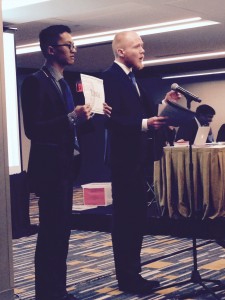Imperial Domination and Pushback in the World Health Organization
By JOHN SUNUNU, AGENCE FRANCE-PRESSE
Normally a quiet, orderly, and scientifically minded community, the World Health Organization committee at the sixty-first iteration of Harvard National Model United Nations is currently anything but. Our reporters at Agence France-Presse quickly discovered brewing tensions within the body stemming from a prevailing sense of imperialism. Closer investigation revealed that the United States, represented in the committee by its two delegates, has been conducting a subtle campaign of vote-gathering and disseminating information in order to protect its vested interests in the two topics of discussion, biofortification and pharmaceuticals. Agence France-Presse investigates the behind-the-scenes world of public health in the United Nations.
The particular structure of this year’s World Health Organization committee lends itself to both robust debate and ideological squabbles. Its 150-some members, who hail from each of the six inhabited continents, each have equal voting power, akin to most legislative and judicial bodies in the United Nations. What makes this particular structure impractical for a committee such as the World Health Organization, lamented the representative of one prominent European state who otherwise wished to remain anonymous, is the “complete and utter disparity medical research expenditures and pharmaceutical production levels among the different countries in this room.”
Unsurprisingly, the United States — the world’s largest spender in scientific research and development and home to the renowned National Institutes of Health research laboratory complex — echoed these sentiments in an opening speech that set the tone of debate for the first committee session. Ostensibly eager to protect its high-value interests in medical research and drug development in both the public and private sectors, the United States lambasted the committee for its willingness to consider allowing developing countries to co-opt drug patents filed abroad to allow developing countries to produce generic versions of expensive drugs to sell on domestic markets.
“This proposal,” fumed one North American delegate who wished to otherwise remain anonymous, “is going to destabilize our entire pharma sector.” The delegate expressed further concern for the proposal, noting that “foreign markets are an important area of revenue generation for our domestic pharma companies.”
Despite this fiery rhetoric emanating from the United States and other vested countries in Western Europe, a number of other member states chose to hold their ideological ground. In a memorable speech that paid homage to its 300,000 citizens who have died from complications due to HIV/AIDS over the last 15 years, South Africa called upon the international community to regulate drug prices to ensure their long-term affordability for people of all socioeconomic status. The country’s representative spoke openly about the “issue of rising [pharmaceutical] prices around the world” and cautioned member states that even countries who are currently able to afford sufficient drugs for their entire population may find themselves unable to do so in the near future given this worrisome trend.
Equally notable was the presence of smaller member states in the fight against the overbearing presence of the United States. Tonga, a small island nation of just 105,000 residents, was equally quick to criticize the emerging western power bloc for its alleged inability to empathize with smaller states.
“As a smaller African country,” one delegate whispered to us off the record following the Tongan speech, “we completely agree with the delegate’s ideas, but we haven’t figured out how to put them into action.”
The World Health Organization committee can be found in the Gloucester Ballroom on the fourth floor of the Marriott Copley Place Hotel.




Recent Comments